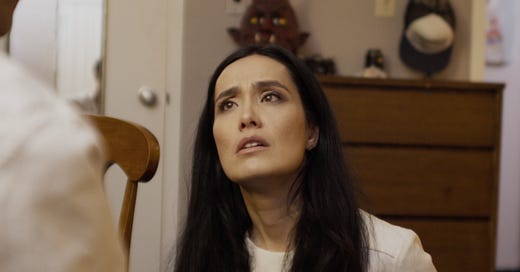The Acting Advice that Became Bedroom Advice
But not the way you would expect, since the bedroom is not the place to perform
Sex and Style is written by Somatic Sex Coach Sarah Ward. This is intended as general advice. If you’d like a personalized guidance, I’d be honored to connect with you in a discovery session.
I’m about to film a break-up sequence with my boyfriend and am freaking out.
We’re a month into filming his first full-length feature film. As an independent filmmaker on a shoestring budget, he cast himself as lead. He cast me as his female lead. Who better to kiss on-screen?
In the break-up scene, I have to cry. Sure, I grew up in drama club (drama queen, ahem) and with lead roles under my belt. But this feels high stakes.
So, we hire an acting coach.
Linnea Larsdotter is my Swedish actor friend who lives in NYC and runs her own production company. She founded the Nordic Film Festival that’s been going strong for 10 years running.
In our two hour Zoom session, Linnea shares a pearl of wisdom from the Meisner acting methodology she uses that will never leave me:
Everything you need is in the other person.
We don’t have to prepare our reactions or ideas for how we want to play the scene. We just have to feed off of what the other person supplies. It will spark its own reactions in us that is authentic to the moment. Each take will be its own living, breathing organism. No need to fabricate a single emotion.
Fast forward to the confrontation scene. We do 18 takes and don’t cut until the early hours of the morning.
Between takes, I try to get as sad as possible to ready the waterworks. I read Amy Turn Sharp essays. I listen to Max Richter, the saddest music I can get my hands on. I cry and reapply makeup between each take.
To set the scene, some shady shit has just gone down. My character is confident that she can change her man (is there a woman on the planet who hasn’t?) and fix things. He has made his decision for a life that doesn’t involve her.
I bargain. He resists.
I beg. He stonewalls.
There is nowhere else for me to go but away.
He gives me everything I need by giving me nothing at all.
In the scene, I move through all five stages of grief. I am in disbelief. I bargain and beg. I seethe. I dip low. And finally, accept.
Take #14 is the one.
When I watch the scene later, the micro expressions are what surprise me. It all feels so real. Because it is.
It turns out that this acting advice transfers well to the bedroom, too.
I’m not talking about performative sex. There is more than enough of that on the internet that we don’t need in our bedrooms, thankyouverymuch.
Everything you need is in the other person.
Here’s how this can look.
The bedroom is an excellent place to have all your senses on.
It’s a place to improvise.
To respond to a touch. A look. A breathless request.
To reciprocate what you are given by the person in the scene opposite you.
The benefit of responding in this way can allow more variety and connection to bloom.
When I was in elementary school, I saw the Chicago White Sox logo on my classmates’ jackets, and was convinced it read s-e-x. What a fallen, depraved world we were living in if children were wearing clothes with the word sex on it!
Like my teacher Jaiya says, since we have been socialized not to talk about sex, we were inadvertently brought up to have bad sex.
If the topic makes you uncomfortable, I’m not surprised.
Sex-ed at your school may have looked like abstinence. (It certainly didn’t include a word about pleasure)
You may have been brought up in a church with purity culture, like me.
We are sadly lacking in our sex education, though we’re all doing our best with the maps we’ve pieced together.
Could it be better? Yes.
You weren’t born already knowing how to play the guitar, or hit a home run, or apply eyeliner.
You were, however, born with a comfort in your own body — babies in the womb touch their genitals — only for this to be swiftly unlearned.
In your first few years of life, chances are you had some sort of shaming experience with a parent or authority figure that made you believe that touching your body was wrong or bad or shameful.
When it comes to pleasure and sex, there is unraveling to do. There is deep reclamation work here. How do you know? The charge.
Sex is a skill. Talking about sex is a skill. And like any skill, it can be taught.
Recently during The Pleasure Collective, my group coaching container, one of the women told me, “You must have gone through incredible work to be able to speak about these subjects so openly.” It’s true. I have.
Is there a way that I can be supportive for you on your journey? I invite you to schedule a complimentary 30-minute session with me. It would be an honor to be in your corner.
Back in the Zoom acting class, Linnea suggests that we play out the scene with our backs to each other.
I can’t see him, but I can feel him.
We respond to the energy between us, unseeing, with only our bodies to guide us. (Tell me that doesn’t sound like sex!)
Afterwards, she reflects what she sees unfold in our bodies: When I inevitably pull away, he feels the lack of connection and tries to regain connection.
Acting is a dance. Connection is a dance. Intimacy is a dance.
Let’s learn the steps together.
Sex and Style is written by Certified Somatic Sex and Relationship Coach and Wardrobe Stylist, Sarah Ward. She has spent the last 20 years studying human sexuality and minted it in 2021, certifying in the VITA™ Methodology with Layla Martin and as an Erotic Blueprints™ Coach with Jaiya. For personalized support, schedule a free discovery call with Sarah.
I’m so glad you’re here. If something about this resonated with you, please press the heart ♥️ button to help other people discover it, too. If this was supportive for you, please consider becoming a free or paid subscriber to keep posts like this coming.











Shit I LOVED this!
I did some acting too, I never heard this piece of advice - it’s gold, and yes it absolutely transfers to the bedroom and I imagine takes away the performance aspect and brings us right back to trust in the alchemy moment by moment!